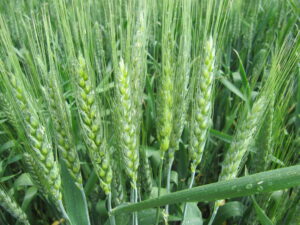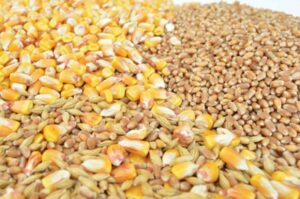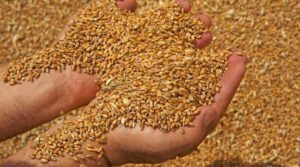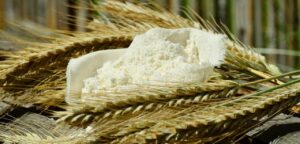
In early October, IMC Agro Holding completed sowing of winter wheat for the 2024 harvest on 20.3 thou hectares, the company’s press service reported on Facebook.
According to the report, the warm and dry weather in September allowed IMC to sow all the planned areas with winter wheat, and the precipitation in the second decade of October helped to get friendly winter shoots.
In addition, at the end of the second decade of October, the agroholding completed threshing sunflower on an area of 32.1 thou hectares, harvesting 92.7 thou tons with an average yield of 2.9 tons/ha.
At the same time, the yield on the land in the north of Chernihiv region, which was not cultivated last year due to the occupation and the subsequent need to inspect for explosive devices, amounted to 2.2 tons/ha. On the rest of the IMC areas in Chernihiv, Sumy and Poltava regions, the sunflower yield amounted to 3.3 tons/ha.
“As for the sunflower harvest, its average yield is not a record for IMC, given the above-mentioned objective reasons, but nevertheless, the total yield and quality of sunflower give hope for its successful sale for processing,” said Oleksandr Verzhykhovsky, Chief Operating Officer of IMC.
As reported, in the 2023 season, IMC obtained a record average winter wheat yield of 7.1 tons/ha, which was the highest result in the 25 years of the agricultural holding’s operation. The company allocated 33.3 thou hectares for the crop, from which it harvested 236 thou tons of grain.
“IMC specializes in growing grains, oilseeds and milk production in Ukraine. It cultivates about 123.3 thousand hectares of land in Poltava, Chernihiv and Sumy regions. It has storage capacities of 554 thousand tons of grains and oilseeds.
In January-March 2023, IMC Agro Holding posted a net loss of $4.10 million, down 2.6 times year-on-year, largely due to higher logistics and distribution costs. The holding’s revenue increased by 11% to $41.96 million, of which exports accounted for $35.03 million. IMC’s gross profit grew 3.9 times to $8.60 million due to lower costs. Due to a twofold increase in logistics and distribution costs (up to $9.40 million), the company recorded an operating loss of $2.85 million, which is twice as good as in the first quarter of 2022.

The U.S. Department of Agriculture (USDA) has improved its forecast for Ukraine’s wheat harvest in the recently started 2023/24 marketing year (MY) from 21 million tons to 22.5 million tons, and for corn from 27.5 million tons to 28 million tons due to larger than expected planted areas and the second-highest yields on record.
In its September forecast, the agency also raised its wheat export estimates from 11 million tons to 11.5 million tons, while corn exports remained unchanged at 19.5 million tons.
The USDA raised its domestic consumption forecast for wheat from 8.1 million tons to 8.8 million tons, while maintaining its forecast for corn at 5.5 million tons, and at the same time raising its carryover forecast to 4.43 million tons from 3.89 million tons.
In general, the global wheat harvest forecast for 2023/24 MY has been lowered by 56 mln tonnes to 787.3 mln tonnes, which is 3.25 mln tonnes less than last year, due to the decrease in production in Australia, Canada, Argentina and the EU, which will not be compensated by the increased production of Ukraine.
The forecast of world wheat trade was also downgraded by 2.1 million tons to 207.3 million tons compared to 219.9 million tons last year due to the decline in production in the above countries, which is only partially offset by the growth of activity in Russia and Kazakhstan.
The USDA noted that such annual decline in the world wheat supplies is the first since 2018/19 MY. The agency also expects the reduction of the global carry-over stocks by 7 mln tonnes to 258.6 mln tonnes, which will be the lowest level since 2015/16 MY.

IMK Agroholding has finished reaping winter wheat from the area of 33.3 thousand hectares and threshed 236 thousand tons of grain with a record yield of 7.1 tons/ha, its press service reported on Facebook on Thursday.
“The area to threshing this year was more than 80% more than the traditional for our company area under winter crops, which was caused by changes in the crop rotation structure in favor of winter wedge instead of corn. Nevertheless, we managed to harvest the entire crop promptly and get an excellent result, despite last year’s prolonged sowing of winter wheat and the reduced amount of fertilizers used,” – said IMK’s Chief Operating Officer Alexander Verzhikhovsky, whose words are quoted in the message.
As reported, agricultural holding “IMK” specializes in the cultivation of cereals, oilseeds and milk production in Ukraine. It cultivates about 123.3 thousand hectares of land in Poltava, Chernihiv and Sumy regions. It owns storage facilities for 554 thousand tons of grain and oilseeds.
In January-March 2023, IMK posted a $4.10 mln net loss, which is 2.6 times less than in the same period of 2022 and largely due to higher logistics and distribution costs. Revenue increased 11% to $41.96 million, of which $35.03 million came from exports. Gross profit increased 3.9 times to $8.60 mln due to a decrease in production costs. Due to a twofold increase in logistics and distribution costs (to $9.40 mln), the company recorded an operating loss of $2.85 mln, which is twice as high as in the first quarter of 2022.

Despite a 20% reduction in crop production areas due to the occupation of a number of regions, favorable weather conditions will allow farmers to harvest and export wheat in the 2023/24 marketing year (MY) no less than last season, Minister of Agrarian Policy and Food Mykola Solsky said on the air of the United News marathon.
“The carry-over stocks of crops in 2023 are about five times less than in the 2022 season, when there were 27 million tons of agricultural products in the country as of mid-summer. On average, agriculture has been bringing in about USD2 billion a month to the state budget since the grain corridor started working properly,” he said.
Assessing the prospects for the 2023 harvest, the Minister noted that this season, 20% less production area has been allocated for crops than in pre-war 2021, due to the areas in Donbas, Zaporizhzhia and the south of the country that are currently under occupation. He also clarified that during the fall 2022 sowing campaign, winter crops were sown 25% less than in 2021.
“Thanks to the weather, we got a significantly higher yield on these areas. It was not a harsh winter, there were no sharp temperature drops, and there was enough humidity, which led to the increase in yield. It was difficult for farmers to save on seeds, herbicides, and fertilizers. But one factor compensated for the other,” explained Solsky.
Speaking about this season’s spring crop harvest, the Minister emphasized that a combination of natural and climatic factors, including a wet summer and average temperatures, affected the quality of grain, which will be worse than last season.
“We have less milling wheat and more feed wheat. But this is a standard situation for Ukraine, when the season depends primarily on weather conditions,” said the head of the agriculture ministry.
According to him, the tonnage of wheat for export to Ukraine in 2023/24 MY will be not less than last season.
Assessing the readiness of the agricultural business for the autumn-winter period, Solsky reminded that since the beginning of the war, Ukraine has been receiving many donor programs, some of which were implemented through the Ministry of Agrarian Policy. Therefore, the supply of generators, in particular, is many times higher than at the beginning of winter last year.
According to the Minister, gas will be the main challenge for business in the autumn and winter period. A positive factor was its low cost in 2022/23 MY, which was several times lower than before the war. However, in the last few weeks, the price has risen, which will affect the operation of elevators, Solsky explained. However, this factor, in his opinion, will also depend on the weather and the skill of entrepreneurs.
“When we talk about grains, the demand for gas (for the agricultural sector) will depend on the conditions under which corn will be harvested. It will be a wet autumn or not,” the minister said, adding that many farmers are now actively advancing and buying gas.
He stated that there are no gas subsidies for business, as the priority is to provide gas to the population. However, the situation will become clearer in late October and early November, and the agricultural market is preparing for it.

Ukrainian flour millers are increasingly reporting low quality of the new harvest wheat, in some regions the total share of grade 2 and 3 wheat will not exceed 10% of total production, APK-Inform news agency reported.
According to the report, the majority of processors in communication with the agency’s experts noted that they mainly receive offers of wheat with low protein content – up to 11%, a small share – at the level of 11-12% and only a few offers with protein content at the level of 13%.
“Some processors predict that in some regions of the country the total share of wheat of 2nd and 3rd class this year will not exceed 10% of the total production,” the analysts said.
According to them, the current situation with the quality of wheat provides significant support to prices. This week, most Ukrainian millers continued to gradually increase their purchase prices for milling wheat.
As of August 23, the demand prices for wheat of the 2nd and 3rd grades were mostly fixed in the range of 5700-6700 UAH/ton and 5500-6500 UAH/ton CPT, respectively, which is 100-200 UAH/ton higher than at the end of last week, but most buyers raised the minimum and close to them prices, experts explained.
Agrarians continue to restrain the sales of high-quality grains, which provides additional support to prices, APK-Inform summarized.
As reported, Ukraine has already harvested 27 mln tonnes of wheat with record yields, but analysts point out that due to weather conditions, 60% of the crop will be sold as fodder, which is twice as much as last year.

The U.S. Department of Agriculture (USDA) in its August forecast improved the forecast of wheat harvest in Ukraine in the beginning of the 2023/24 marketing year (MY) from 17.5 million tons to 21 million tons, corn – from 25 million tons to 27.5 million tons due to larger than expected planted areas and the second highest yield in history.
At the same time, the document notes, due to the discontinuation of the Black Sea Grain Initiative, the export forecast was kept unchanged at 10.5 million tons and 19.5 million tons, respectively.
As a result, USDA for wheat raised the forecast for domestic consumption from 7.1 million tons to 8.1 million tons, and transitional residues at the end of MY – from 1.59 million tons to 4.13 million tons, while for corn, the entire crop growth forecast is balanced by an increase in expected transitional residues – from 1.89 million tons to 3.89 million tons.
Overall, the U.S. agency increased its forecast for this year’s feed grain harvest in Ukraine from 31.47 million tons to 33.97 million tons, estimating their exports at 21.37 million tons and raising the forecast for transitional residues from 2.27 million tons to 4.77 million tons.
In the update, USDA estimated last MY 2022/23 wheat crop, the same as a month ago, at 21.5 million tons vs. 33.01 million tons a year earlier, and exports at 16.8 million tons vs. 18.84 million tons, respectively, while reducing transitional residues from 5.27 million tons to 1.65 million tons.
The USDA sees the feed grain harvest falling to 33.93 million tons from 53.51 million tons in MY 2021/22, while exports fell to just 30.80 million tons from 32.93 million tons due to a reduction in transitional residues from 8.69 million tons to 2.15 million tons.
Including the corn crop, last MY’s harvest fell to 27 million tons from 42.13 million tons a year earlier, while exports rose to 28 million tons from 26.98 million tons, also due to a reduction in transitional residue from 7.59 million tons to 1.39 million tons.
USDA’s new forecast for the global wheat crop in MY 2023/24 is projected to reach 793.4 million tons, down 3.3 million tons from the previous forecast. Total wheat exports are forecast at 209.4 million tons, 2.23 million tons less than previously expected. Analysts projected final world wheat stocks at the end of MY at 265.6 million tons, 0.92 million tons less than the previous forecast.
For corn, the estimate for this year’s world harvest was lowered by almost 11 million tons to 1 billion 213.5 million tons, while exports were lowered by 2.07 million tons to 196.19 million tons.
The U.S. Department of Agriculture lowered its forecast for U.S. wheat production by 0.13 million tons to 47.2 million tons. Exports are expected at 19.05 million tons (-0.68 million tons).
Corn harvest is down 5.71 million tons to 398.82 million tons and exports are down 1.27 million tons to 58.65 million tons.
In the EU, USDA worsened its wheat crop estimate by 3 million tons to 135 million tons, keeping exports at 38.5 million tons.
For coarse grains, the EU crop forecast has been worsened by 6.85 million tons to 136.45 million tons and exports by 2.21 million tons to 10.59 million tons, with the estimated corn crop now down 3.7 million tons to 59.7 million tons and exports down 0.9 million tons to 4.1 million tons.
For Russia, the forecast for wheat exports at the same crop estimate of 85 million tons is increased by 0.5 million tons to 48 million tons, and coarse grains is kept at 8.91 million tons with the crop estimate lowered by 2.85 million tons to 39.4 million tons. Including corn, exports are still expected at the level of 4.2 million tons with a decrease in the harvest by 1.7 million tons – to 14.6 million tons.